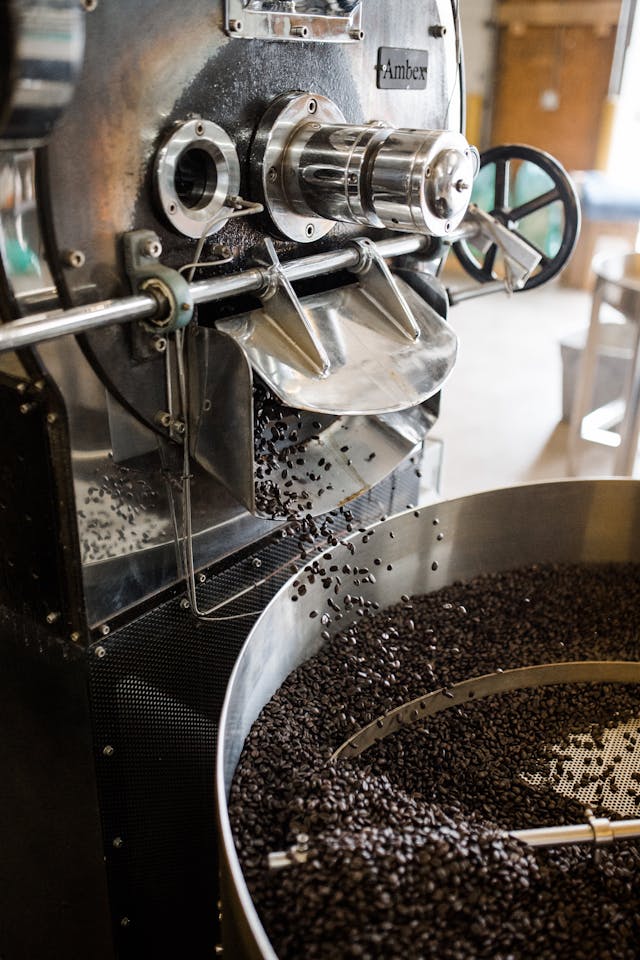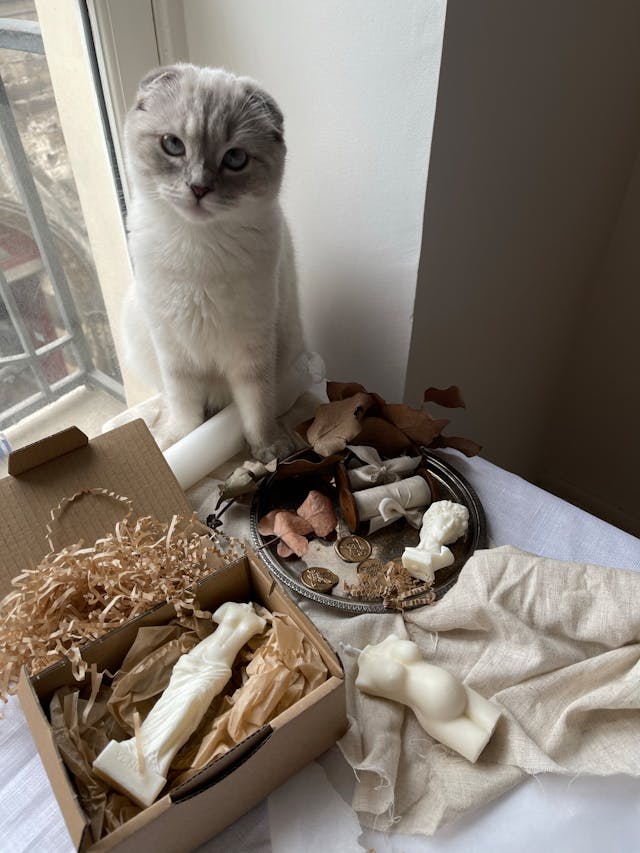Artisanal Coffee Roasting Names: A Guide to Naming Your Specialty Coffee Brand
Your guide to finding the best Artisanal Coffee Roasting business names in 2025.

The Ultimate Guide to Artisanal Coffee Roasting Names
Did you know that the specialty coffee market is projected to grow by over $100 billion in the next five years? As a new artisanal roaster, you're entering a bustling, passionate industry. But in a sea of craft coffee bags, how do you stand out? It starts with the very first thing a customer sees: your name. A great name is more than a label; it’s a promise, a story, and a powerful marketing tool all roasted into one.
Choosing a name for your small-batch, single-origin coffee roastery is one of the most critical decisions you'll make. It can mean the difference between becoming a beloved local staple and getting lost on a crowded shelf. This guide is your definitive resource, designed to walk you through a data-driven process for creating a brand name that resonates, sells, and endures. Ready to find the perfect name for your beans? Create your own breakthrough name.
The Psychology Behind Successful Coffee Roasting Names
A powerful brand name isn't just creative—it's scientific. It works by tapping into fundamental psychological principles that influence how customers think and feel. Understanding these principles is your secret weapon in crafting a name with real impact.
Cognitive Fluency: The Power of Simplicity
Cognitive fluency is the ease with which our brains process information. Names that are simple, familiar, and easy to pronounce are processed more easily. Research from the University of Michigan found that stocks with simpler, more pronounceable names (e.g., "Emerson") consistently outperformed those with complex names. For a coffee roaster, this means a name like "Onyx Coffee Lab" is easier to recall and trust than something like "Quixotic Phyto-Roastery."
Sound Symbolism: What Does Your Name Sound Like?
The sounds within a word can evoke specific feelings or qualities. This is known as sound symbolism or the 'bouba/kiki effect.' Softer sounds (like L, M, N) can feel more luxurious and smooth, while harder sounds (like K, P, T) can feel more abrupt and energetic. A name like "Luma Coffee" might suggest a gentle, light roast, while "Sparkplug Roasters" implies a high-energy, powerful brew. Think about the profile of your coffee and choose sounds that match.
Here’s how these principles translate into brand perception:
| Psychological Principle | Impact on Brand Recall | Consumer Perception of Coffee |
|---|---|---|
| Cognitive Fluency | Up to 35% higher recall | More trustworthy, approachable, higher quality |
| Evocative Names | 21% stronger emotional connection | Creates a story, suggests a unique experience |
| Sound Symbolism | Influences perceived flavor profile | 'K' sounds for bold, 'S' sounds for smooth |
Proven Naming Strategies for Artisanal Roasters
Successful coffee brands often use established naming strategies. By understanding these archetypes, you can find a framework that fits your brand's unique story and mission.
1. Evocative & Metaphorical Names
These names don't describe the product literally but suggest a feeling, benefit, or story. They are powerful because they create an emotional connection and a sense of mystique.
- Real-World Example: Stumptown Coffee Roasters. The name evokes a sense of rugged exploration and discovery, aligning perfectly with their pioneering brand story.
- Why it works: It builds a brand world that customers want to be a part of.
2. Compound Names
Compound names combine two familiar words to create something new and memorable. They are often catchy and can cleverly hint at the brand's focus.
- Real-World Example: Blue Bottle Coffee. The name is simple, visually interesting, and has a unique origin story (referencing one of Europe's first coffee houses), giving it depth and brandability.
- Why it works: It's often highly brandable and easy to remember.
3. Abstract & Invented Names
These names are created from scratch. While they require more marketing effort to build meaning, they offer a completely blank slate and are almost always available for trademarking.
- Real-World Example: Verve Coffee Roasters. "Verve" means spirit, enthusiasm, and vigor—perfectly capturing the brand's energetic, coastal California vibe.
- Why it works: It's unique, protectable, and can be infused with any meaning you choose.
4. Founder or Persona-Based Names
Using a real or fictional person's name can add a personal, authentic touch. It makes the brand feel more human and story-driven.
- Real-World Example: Peet's Coffee. Named after founder Alfred Peet, it grounds the brand in a legacy of expertise and passion.
- Why it works: It creates a sense of heritage and personal accountability.
Here’s a comparison of these common strategies:
| Naming Strategy | Memorability | Domain Availability | Brand Story Potential |
|---|---|---|---|
| Evocative | High | Medium | Very High |
| Compound | High | Low | Medium |
| Abstract | Medium (builds over time) | High | High (blank slate) |
| Founder/Persona | Medium | High | High (built-in story) |
5 Common Naming Mistakes to Avoid
Choosing the wrong name can be a costly mistake. Here are five common traps to avoid on your naming journey.
-
The Geographic Trap: Naming your business "Seattle Specialty Beans" seems great—until you want to expand to Denver. Tying your name too closely to a specific location can limit your future growth and appeal. How to avoid it: If you want to evoke a place, use suggestive names (e.g., "Ridgeline Roasters" for a mountain town) rather than literal ones.
-
The Spelling Creativity Curse: A name like "Koffee Kraft" or "Xpresso Roasting" might seem clever, but it’s a nightmare for customers trying to find you online or tell a friend. If you have to spell your name out loud, it’s too complicated. How to avoid it: Prioritize clarity and intuitive spelling.
-
The "Me Too" Name: Avoid generic, descriptive names that sound like everyone else. "Artisanal Coffee Roasters" or "The Specialty Bean Co." are forgettable and fail to differentiate you. How to avoid it: Focus on what makes you unique—your process, your origin story, your philosophy—and build the name from there.
-
The Acronym Abyss: Using initials like "S.B.R." (Smith Brothers Roasting) is meaningless to new customers. Acronyms lack personality and are hard to remember unless you have a massive marketing budget (like IBM or KFC). How to avoid it: Spell it out. "Smith Brothers Roasting" has far more character and story potential.
-
The Restrictive Descriptor: What happens when "Single Origin Roasters" decides to launch an amazing new blend? The name becomes inaccurate and limiting. How to avoid it: Choose a broader name that allows your business to evolve. Focus on your brand's ethos rather than a specific product feature.
The Complete Name Validation Framework
Once you have a shortlist of names, it's time to put them to the test. This validation framework ensures your chosen name is strong, available, and resonates with your target audience.
Step 1: Internal Validation (The SPARK Test)
Run your top names through this five-point checklist:
- S - Suggestive: Does it hint at your brand story, ethics, or coffee quality?
- P - Pronounceable: Is it easy for customers to say and share?
- A - Appealing: Does it have a pleasing sound and aesthetic?
- R - Remarkable: Is it unique and memorable enough to stand out?
- K - Kernable: Does it have a unique "kernel" or root that can be built upon?
Step 2: Market Testing (The 5x5 Method)
Don't rely solely on your own opinion. Get real-world feedback.
- Select your audience: Find 5-10 people who represent your ideal customer (e.g., local cafe enthusiasts, home brewing hobbyists).
- Present your names: Show them your top 3-5 names without any context or explanation.
- Ask open-ended questions:
- "Which of these names stands out to you the most? Why?"
- "What kind of coffee would you expect from a company with this name?"
- "How would you spell this name if you heard it?"
- Listen and analyze: Look for patterns in their responses. Is one name consistently perceived as more premium, friendly, or trustworthy? Is another consistently misspelled?
Step 3: Legal & Digital Validation
This is a non-negotiable step to avoid future legal headaches and branding issues.
- Domain Check: Is the
.comdomain available? While other TLDs exist, the.comis still the gold standard for credibility. Use a domain registrar to check availability. Generate and analyze your name to see domain availability instantly. - Social Media Handles: Check if the name is available on your primary social media platforms (Instagram, TikTok, Facebook).
- Trademark Search: Conduct a preliminary search on the USPTO's TESS (Trademark Electronic Search System) database to see if the name is already trademarked in your class (Class 30 for coffee). It's highly recommended to consult a trademark attorney for a comprehensive search.
Your Legal and Domain Strategy
Securing your digital and legal assets is as important as perfecting your roast profile. Your domain name is your digital storefront, and your trademark is your brand's shield.
Domain Investment
Your domain name is a long-term investment. While it can be tempting to go for a cheap alternative, owning the exact match .com is a significant competitive advantage.
- Tier 1 (Bootstrapped Budget: $10 - $100): Focus on hand-registering an available
.com. This may require more creativity with your naming, perhaps using a compound name or a modifier (e.g., "DriftwoodRoasters.com"). - Tier 2 (Growth-Focused Budget: $500 - $5,000): This opens up the possibility of acquiring a premium, aftermarket domain. These are short, memorable
.comdomains that someone else has already registered. They are more expensive but offer immense brand value. - Tier 3 (Brand Leader Budget: $5,000+): For top-tier, one-word, or highly desirable domains. This is a serious investment for brands aiming for significant market leadership.
Trademark Strategy
A trademark legally protects your name, logo, and slogan from being used by competitors.
- Conduct a Thorough Search: Before you print a single bag, ensure your name is clear. A trademark attorney can help with a comprehensive search.
- File Your Application: Register your trademark with the USPTO. This process can take several months but provides nationwide protection.
- Use the Correct Symbol: Use ™ for an unregistered trademark to claim it as your own, and ® once it has been officially registered.
Measuring Your Name's Success
How do you know if your name is working? Track these Key Performance Indicators (KPIs) after you launch:
- Brand Recall: In customer surveys, ask "When you think of local specialty coffee, what brands come to mind?" See if your name is mentioned.
- Direct & Branded Search Traffic: In Google Analytics, track how many visitors come to your website by typing your name or URL directly into their browser. An increase indicates growing brand awareness.
- Word-of-Mouth (WOM) Mentions: Use social listening tools to track how often your brand name is mentioned on platforms like Instagram and Twitter. Positive WOM is a strong indicator of a resonant name.
50 Data-Driven Business Name Ideas
Here are some name ideas for an artisanal coffee roastery, grouped by strategy and explained.
Evocative & Story-Driven Names
- Fable Coffee Roasters: Suggests each coffee has a unique story.
- Pilgrim Roasting Co.: Evokes a sense of journey and discovery.
- Kindred Roasters: Implies community and connection over coffee.
- Northstar Coffee: A guiding light for coffee quality.
- The Gilded Bean: Suggests a premium, valuable, and carefully treated product.
- Hearthside Roasters: Creates a feeling of warmth, comfort, and home.
- Wanderlust Beans: Appeals to the adventurous spirit of exploring single-origin flavors.
- Sunstone Coffee: Sounds warm, natural, and positive.
- Aether Roasters: Suggests something ethereal, light, and of the highest quality.
- Cinder & Bloom: A beautiful metaphor for the roasting process (cinder) and the resulting flavor (bloom).
Modern & Minimalist Names
- Onyx Coffee Lab: Scientific, precise, and premium.
- Stasis Coffee: Suggests a moment of perfect balance and calm.
- Methodical Roasters: Highlights a precise, repeatable process.
- Array Coffee: Implies a wide, curated selection of beans.
- Luma Coffee: A name associated with light; suggests bright, vibrant flavors.
- Venn Roasters: Implies the perfect intersection of bean, roast, and brew.
- Caliber Coffee: Suggests a high standard of quality.
- Chapter Coffee: Positions each bag as a new part of a larger story.
- Solum Roasters: Latin for 'soil', emphasizing a connection to the earth.
- Monad Coffee: A philosophical term for a single, indivisible entity - perfect for single-origin focus.
Location-Inspired & Terroir-Focused Names
- Ridgeline Roasters: Evokes a sense of place without being overly specific.
- Terroir Coffee Collective: Directly speaks to the importance of soil and origin.
- Mesa Roasting Co.: A strong, earthy name inspired by landscapes.
- Foothills Coffee: Suggests origins from coffee-growing mountain regions.
- Alpenglow Roasters: Connects the coffee to beautiful, natural moments.
- Highland Coffea: Uses the botanical name for coffee for a sophisticated touch.
- Origin Point Roasters: Clearly states a focus on single-origin beans.
- Archipelago Coffee: Suggests a collection of unique islands of flavor.
- Grove & Valley Roasters: Paints a picture of the agricultural landscape.
- Delta Coffee Works: A good name for a roastery in a river delta region.
Scientific & Process-Oriented Names
- First Crack Coffee: A nod to a key moment in the roasting process that enthusiasts will recognize.
- The Maillard Project: References the Maillard reaction, the chemical process behind browning and flavor.
- Kinetic Roasters: Implies energy, movement, and a dynamic process.
- Catalyst Coffee Roasting: Positions your coffee as the agent of change for someone's day.
- Alchemy Coffee Roasters: Frames roasting as a magical transformation of lead (green beans) into gold (perfect coffee).
- Datum Roasters: A term for a fixed starting point of a scale or operation; suggests precision.
- MicroLot Coffee: Directly references small, specific batches of high-quality beans.
- Bloom & Cycle: Refers to the coffee bloom and the cycle of harvesting and roasting.
- Ratio Coffee Roasters: Highlights the importance of precision in brewing.
- Helix Roasting Co.: Suggests a complex, intertwined structure of flavors.
Your Next Step
Choosing a name is a journey, not a sprint. You've learned about the psychology of a great name, explored proven strategies, identified common mistakes, and walked through a rigorous validation framework. Your brand name is a foundational asset that will define your business for years to come. It’s the story you tell on every bag, every cup, and in every conversation.
Take this knowledge, start brainstorming, and be deliberate in your process. The perfect name for your artisanal coffee roastery—one that captures your passion for ethically sourced, single-origin beans—is within your reach. When you're ready to bring your ideas to life, we're here to help. Explore and validate your name ideas now.
Related Posts



